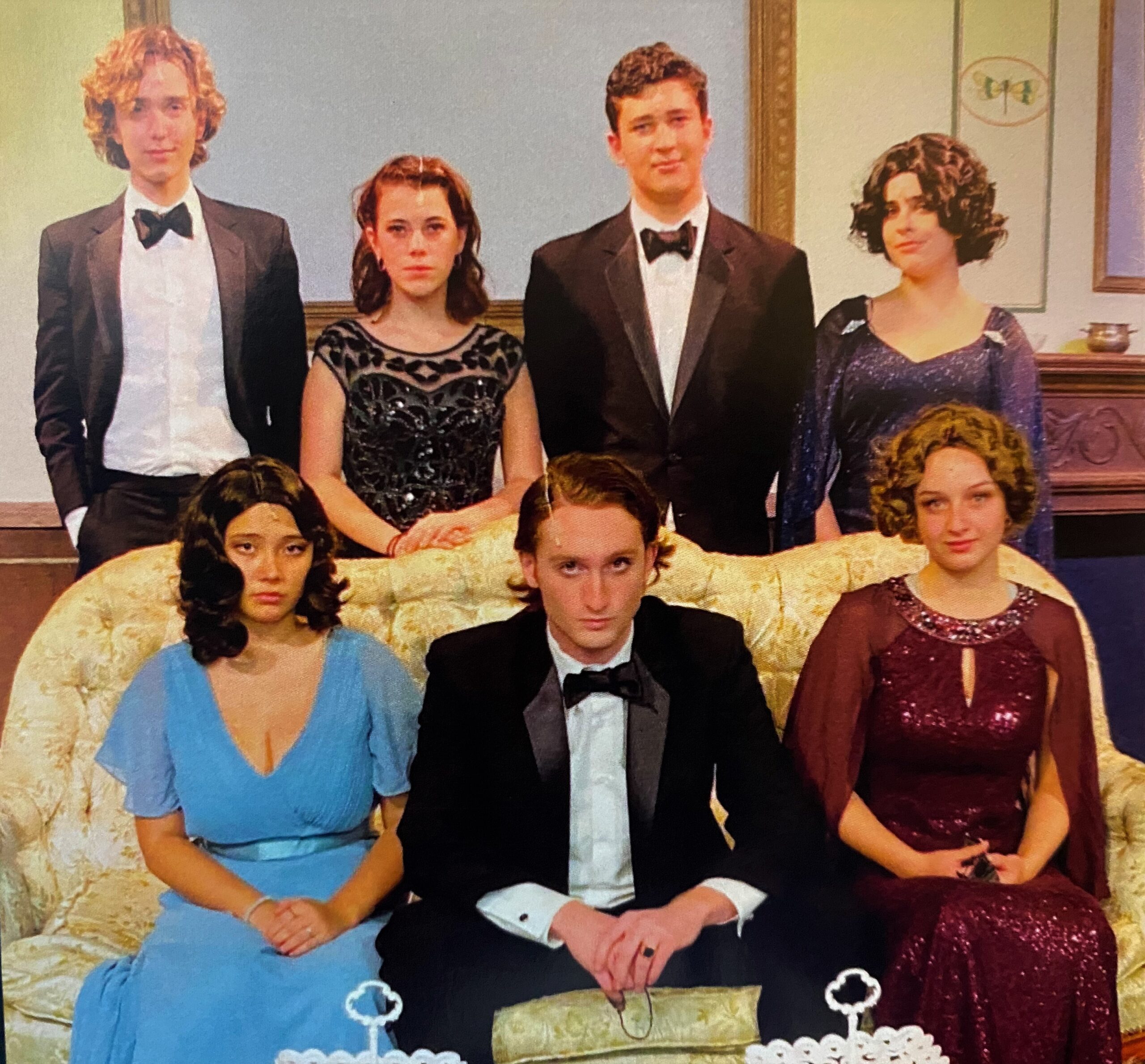
Members of the cast of “Dangerous Corner” are (back row, left to right) Henry Mueller, Ginger Simpson, Spencer Rodman and Stella Simons; (front row: Kaela Tagliaferro, Nicolas Libonati and Oona Fitzmaurice.
“The point is, I think—there’s truth and truth. … the real truth—that is, every single little thing, with nothing missing at all, wouldn’t be dangerous. … But what most people mean by truth, what that man meant in the wireless play, is only half the real truth. It doesn’t tell you all that went on inside everybody.” Olwen – character from “Dangerous Corner”.
The original Broadway production of “Dangerous Corner” by J.B. Priestley opened at the Empire Theatre in October 1932 and ran for 206 performances.
This month the Palisades High drama department has undertaken not only this period piece, but one set in the English countryside. Actors and directors Sheri and Monique Smith are to be commended for going the difficult route — and succeeding.
This is a play that leaves you thinking well after you leave Mercer Hall, which serves as the drawing room at Freda and Robert Caplan’s country house.
J.B. Priestley’s play, essentially a murder mystery, is the first that he wrote questioning the theory that there are other forms of time than the purely linear one.
For example, say you’re late in getting out of the house and then you’re on the freeway and you come upon an accident that happened just a few minutes earlier—could you have been involved?
Priestly asks, If something is said or not said, if one makes a choice, could it change the outcome of life?
The play starts with four women, Freda, Miss Mockridge, Olwen and Betty, listening to a radio play, “The Sleeping Dog.”
Freda Caplan (Ginger Simpson) is married to Robert (Nicolas Libonati). He owns a publishing company with Gordon Whitehouse (Henry Mueller) and Olwen Peel (Oona Fitzmaurice). Gordon is married to Betty (Kaela Tagliaferro). Another member of the company is Charles Stanton (Spencer Rodman). Miss Mockridge (Stella Simons) is a novelist who has joined the “publishing” family for the evening.
The women are joined by Robert, Gordon and Stanton for drawing room conversation and drinks.
A chance remark by Olwen steers the play into an area where Robert demands to know the truth about his brother Martin’s death. It initially was ruled a suicide.
Then the audience listens in growing horror as the characters reveal their real feelings. We learn that Freda was in love with Martin but was never able to tell her husband. Their marriage has been filled with lies.
Freda feels that Martin was fond of her, but other characters dispute that. It seems that the characters have been defined by how others see them, rather than who they are.
Critic Francis Bass wrote, “This is what the play fixates on, at all levels—the coexistence of multiple narratives. On the largest scale, the play itself presents two alternate narratives that coexist on the same stage—one in which a myriad of secrets is revealed, and one in which nothing is revealed.”
People continue to believe their own truths, until Robert forces the confrontation. And as Olwen says, “There’s truth … and truth.”
And what if you could take something back, a comment, an action? Would that change anything?
Unlike many early plays, this ensemble piece continues to be produced – and it still resonates strongly today.
The acting is routinely good, and that’s not an easy task for teens who live in 2021 and most likely have never set foot in an English country home—or worked on the posture and mannerisms needed to perform a period piece. Bravo to all.
The costuming is also delicious, thanks to expert work by Safiye Gurdil, Evangeline Lindes and Jasmine Nasseri for their work.
If you want a thought-provoking evening (I’m still mulling over some of the questions raised), there are only three more performances: on Thursday, Friday and Saturday at 7 p.m. Tickets (VIP $25, general admission $16 and students $10) must be purchased online: go.palhigh.org/GoFan. Proof of Covid-19 vaccination required.

Great review…. the website incorrect in getting tickets…. It’s Palihigh
better link….
https://gofan.co/app/school/CA18976